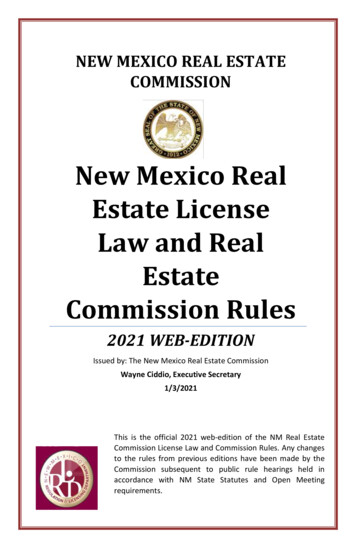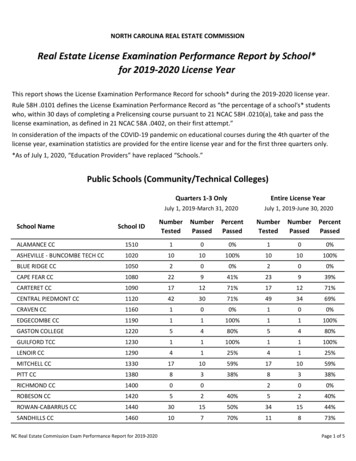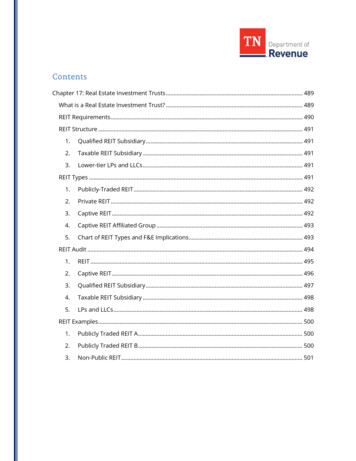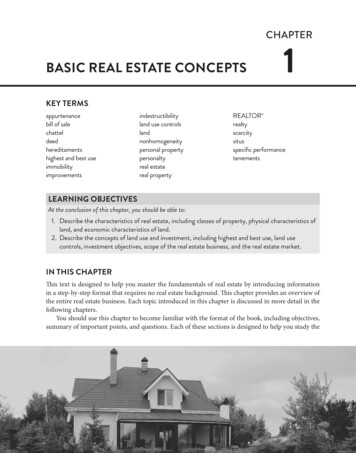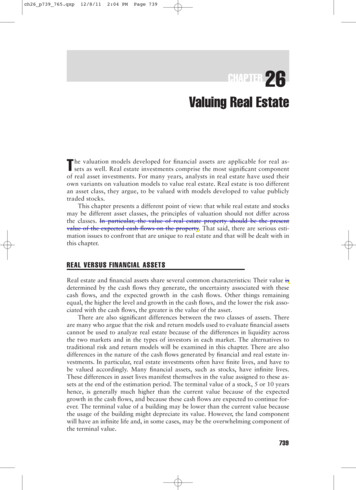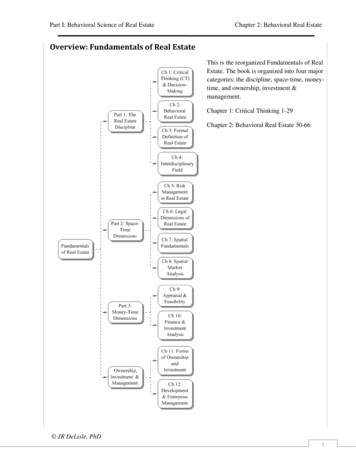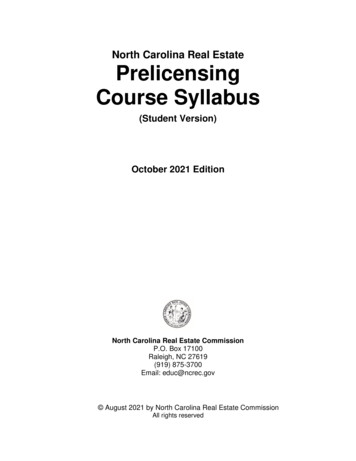
Transcription
North Carolina Real EstatePrelicensingCourse Syllabus(Student Version)October 2021 EditionNorth Carolina Real Estate CommissionP.O. Box 17100Raleigh, NC 27619(919) 875-3700Email: educ@ncrec.gov August 2021 by North Carolina Real Estate CommissionAll rights reserved
INTRODUCTIONMission Statement: The Prelicensing Course is an introductory level real estate principles andpractices course with heavy emphasis on real estate brokerage law and practice.Required Course for Real Estate Licensure in North Carolina: Successful completion of thePrelicensing Course is generally required to qualify for the North Carolina real estate licenseexamination and to obtain a North Carolina real estate broker license.Course Description: This course is intended to(1) provide students with the basic knowledge and skills necessary to act as a licensed realestate broker in a manner that protects and serves the public interest; and(2) prepare students for the North Carolina real estate license examination.Major topics basic real estate concepts and lawproperty taxationland use controlsenvironmental hazardsbrokerage relationships andpracticesreal estate contractsreal estate financingclosing a real estate sale transactionreal property valuationproperty insurance basicsfair housing laws landlord and tenantproperty managementfederal income taxation of realestatebasic constructionbasic real estate investmentNorth Carolina Real Estate LicenseLawNorth Carolina Real EstateCommission Rules and TrustAccount GuidelinesRequirements for Offering the Course: This course may only be offered by Commissioncertified Education Providers (EPs) that have received course approval for each specific coursedelivery method. EPs may only use instructors approved by the North Carolina Real EstateCommission to teach Prelicensing and Postlicensing courses. Rules governing the conduct of thecourse, including scheduling, course delivery, course completion standards, course completionreporting, and other related matters may be obtained on the Commission website(www.ncrec.gov). The Prelicensing Course must be taught as prescribed by the Commission inthis Syllabus.Course Hours and Delivery Method: The Prelicensing Course must consist of a minimum of75 instructional hours, although approved Education Providers may, at their option, schedule thecourse for more than 75 hours. The course may be offered via in-person, synchronous distance,distance, or blended delivery. Pre-approval is required for each type of course delivery.Course Materials: Per Commission Rule 58H .0205(c), the EP shall verify that each enrolledstudent possesses all course materials by the first class session. Required course materials arelisted at the end of this Syllabus in the Materials Section.Course Scheduling: Refer to Commission Rule 58H .0404 for course scheduling parameters.Prelicensing Course Syllabusii August 2021 North Carolina Real Estate Commission
Commission Rule 21 NCAC 58H .0304: Instructor Conduct and Performance(a) All instructors shall ensure that class sessions are conducted at the scheduled time and for thefull amount of time that is scheduled or required. Instructors shall conduct courses in accordancewith the Commission's rules, and any applicable course syllabi, instructor guide, or course plan.Instructors shall conduct classes demonstrating the ability to:(1) state student learning objectives at the beginning of the course and present accurateand relevant information;(2) communicate correct grammar and vocabulary;(3) utilize a variety of instructional techniques that require students to analyze and applycourse content, including teacher-centered approaches, such as lecture anddemonstration, and student-centered approaches, such as lecture discussion, reading,group problem solving, case studies, and scenarios;(4) utilize instructional aids, such as:(A) whiteboards;(B) sample forms and contracts;(C) pictures;(D) charts; and(E) videos;(5) utilize assessment tools, such as:(A) in-class or homework assignments, and(B) quizzes and midterm examinations for Prelicensing and Postlicensing courses;(6) avoid criticism of any other person, agency, or organization;(7) identify key concepts and correct student misconceptions; and(8) maintain control of the class.(b) Instructors shall not obtain, use, or attempt to obtain or use, in any manner or form, NorthCarolina real estate license examination questions.Real Estate Mathematics Instruction: Instruction on relevant mathematical functions is to beprovided under the appropriate subject areas rather than as a separate arithmetic course section.To assist instructors, however, all required real estate mathematics instruction is listed in SectionXXIII of the Outline. Consideration was given to the amount of mathematics involved in eachsubject area when establishing the recommended number of instructional hours for subject areas.This integrated approach is recommended because it helps assure that students understand howvarious mathematical functions relate to the various areas of real estate practice. Instruction inbasic mathematics concepts such as decimals, fractions, percentages, multiplication, division,etc. is not included in this course syllabus. Students deficient in basic math skills should beprovided special assistance outside of class or directed to take a math refresher course.End-of-Course Examinations and Completion Standards: For successful completion of thecourse, students must1. satisfactorily complete any required activities and homework exercises,2. meet attendance requirements, and3. pass the end-of-course examination.Instructional time should only be used for the introduction, and review upon completion, of thehomework assignment(s).EPs are required to utilize end-of-course examinations in accordance with Commission Rule 58H.0207. End-of-course exams must be closed-book and proctored. The minimum passing grade is75%. The Commission recommends that certified EPs and approved instructors use end-ofcourse examinations that are comprehensive in scope. EPs and instructors shall safeguard theintegrity and confidentiality of examinations at all times.Prelicensing Course Syllabusiii August 2021 North Carolina Real Estate Commission
Syllabus Copies: The course Syllabus is posted on the Commission’s website, under Education. EPs and instructors may reproduce all or part of the Syllabus for student use at their ownexpense, and may charge students for the cost of reproduction.Order of Subject Area Presentation: The order in which subject areas are presented in theSyllabus is the recommended order, but instructors may make adjustments in the order ofpresentation.Instructional Levels: The Commission utilizes Instructional Levels to prescribe the scope anddepth of coverage of topics and subtopics throughout the course. There are three levels, withLevel 1 being the lowest and Level 3 being the highest level of instruction. Instructional Levelsare based on Bloom’s Taxonomy.Below are the definitions of the three Instructional Levels, including the prescribed competencyand instruction for each. Competency means what students will be able to do by the end of thetopic/subtopic coverage. Instruction means the prescribed depth of coverage and instructionalmethods.Level 1 – RecallNOTE: Level 1 is based on Bloom’s Taxonomy Level 1-Understand and Level 2-Remember.Competency:Students should be able to recall facts and basic concepts and to explainideas or concepts. Learning objectives may include terms such as define,duplicate, classify, explain, and describe.Instruction:Instructor should review and discuss basic definitions, facts, concepts,procedures, etc. In-depth instruction is not required.Level 2 – ApplicationNOTE: Level 2 is based on Bloom’s Taxonomy Level 3-Apply and Level 4-Analyze.Competency:Students should be able to use information in new situations and to drawconnections among ideas. Learning objectives may include terms such asimplement, solve, demonstrate, interpret, differentiate, relate, compare,and contrast.Instruction:Instructor should review and discuss the topic in moderate depth sufficientto illustrate and enhance understanding of facts, principles, procedures,etc. and their relevance to brokerage practice.Prelicensing Course Syllabusiv August 2021 North Carolina Real Estate Commission
Level 3 –AnalysisNOTE: Level 3 is based on Bloom’s Taxonomy Level 5-Evaluate and Level 6-Create.Competency:Students should be able to justify a stand or decision and to produce newor original work based on the information. Learning objectives may includeterms such as defend, judge, critique, weigh, design, assemble, develop,or formulate.Instruction:Instructor should review and discuss the topic in substantial depth, usingexamples to reinforce understanding of ideas, principles and practices, andrequiring students to complete practical work assignments to demonstrateboth their understanding of the topic and their ability to apply theirknowledge to common fact situations that will be encountered in real estatepractice.Each major topic (i.e., preceded by a capital letter) in this Syllabus has been assigned anInstructional Level. In some instances where a subtopic should be afforded significantly greateror lesser emphasis than the major topic under which it is listed, that subtopic has been assigneda different Instructional Level that applies to that subtopic only.Education Providers and instructors are REQUIRED to comply with the assignedInstructional Levels when teaching this course.Prelicensing Course Syllabusv August 2021 North Carolina Real Estate Commission
RECOMMENDED MAJOR SUBJECT AREA EMPHASISPageNumber ofInstructional HoursSubject AreaCourse Orientation and Overview0.251I.Basic Real Estate Concepts0.752II.Property Ownership and Interests4.59III.Property Taxation and Assessment1.511IV.Transfer of Title to Real Property2.016V.Land Use Controls2.021VI.Environmental Issues in Real Estate0.523VII.Brokerage Relationships: Laws and Practice6.536VIII.Agency Contracts (Sales) and Related Practices6.046IX.Basic Contract Law1.7551X.Sales Contracts and Related Procedures7. 560XI.Real Estate Financing7.071XII.Closing a Sales Transaction8.080XIII.Real Property Valuation6.088XIV.Property Insurance Basics1.2590XV.Landlord and Tenant2.2595XVI.Property Management1.097XVII. Fair Housing1.599XVIII. Federal Income Taxation of Home Ownership/Sale0.75100XIX.Basic Construction1.0105XX.Basic Real Estate Investment0.5105XXI.Real Estate License Law and Commission Rules8.0111XXII. Agent Safety111XXIII. Real Estate Mathematics [No separate time allocation] 0.00.5Review (Instructor Discretionary Time)0.5End-of-course Examination3.5TOTAL INSTRUCTIONAL HOURS75Prelicensing Course Syllabusvi August 2021 North Carolina Real Estate Commission
PRELICENSING COURSESYLLABUSLegend:Notes contain testable points and important information about testing parameters.Italicized terms are basic terms for which students should know the definitions.Required Activities must be completed as part of the course; additional activitiesmay be required by the Education Provider for successful completion of the course.Math calculations should be addressed throughout the course as part of eachappropriate topic.Section I. Basic Real Estate Concepts (0.75 hours) [Level 1]A. Basic Terminology and Definitions1. Land2. Real Estate3. Real Property4. Personal PropertyNote: The terms real property, real estate and land are often usedinterchangeably.B. Physical Characteristics of Land1. Immobility2. Indestructibility3. Uniqueness (Non-homogeneity)C. Economic Characteristics of Land1. Scarcity2. Location (Situs or area preference)3. Improvements4. Permanence of InvestmentPrelicensing Course Syllabus1 August 2021 North Carolina Real Estate Commission
D. General Concepts of Land Use and Investment1. The Highest and Best Use Concept2. Public and Private Land Use Restrictions3. Real Estate as an Investment4. Scope of the Real Estate Business5. The Real Estate MarketSection II. Property Ownership and Interests (4.5 hours)A. The Concept of Property [Level 2 except as noted below]1. Real Propertya. The Bundle of Legal Rights Concept [Level 1– this subtopic]i. Right to possession (to occupy)ii. Right to control (of property and legal profits)iii. Right of enjoyment (to use in any legal manner without interferencefrom others claiming a superior title)iv. Right of exclusion (to restrict access)v. Right of disposition (to transfer ownership or interests including rightto encumber/mortgage)b. Appurtenances (appurtenant rights)i. Subsurface rightsii. Air rightsiii. Water rights Riparian rights Littoral rights Foreshore Boundary shifts due to accretion, reliction, erosion, or avulsion Doctrine of Prior Appropriation [Level 1– this subtopic]Note: Water rights cannot be retained when the property istransferred.iv. Support rights Right to lateral support Right to subjacent supportv. Benefit of any appurtenant easementvi. Benefit of any protective (restrictive) covenantsPrelicensing Course Syllabus2 August 2021 North Carolina Real Estate Commission
2. Personal Property (Chattel or Personalty)a. Moveable itemsb. Severance vs. annexation3. Fruits of the Soil [Level 1– this subtopic]a. Fructus Naturalesb. Fructus Industriales (emblements)4. Fixtures [Level 3 – this subtopic]Required Activity: Use pictures to help students recognize items that mightcause confusion in a transaction. Have students apply the Total CircumstancesTest to predict how a judge might rule if the issue went to court.a. Total Circumstances Testi. Used in court when contract terms are silent about an item; writtencontract terms should clarify intent of contract partiesii. Four (4) test criteria for determining if item is a fixture Intent of annexor Relationship of annexor to property Method of annexation Adaption to real estateNote: The application of all 4 criteria must indicate that an item is afixture. Most standard listing agreements and sales contracts includea list of common items that will be considered fixtures for thetransaction.b. Trade Fixturesc. North Carolina (NC) Agricultural Fixturesd. Effect of NC Uniform Commercial Code (UCC) [NCGS 25-9-313]concerning security interests in fixtures5. Improvements [Level 1– this subtopic]a. Improvements to the landb. Improvements on the landc. Depending on context, Improved Land or Improved Lot may have dualmeaningsNote: On the National exam section, an improvement is an appurtenance.Prelicensing Course Syllabus3 August 2021 North Carolina Real Estate Commission
6. Manufactured (Factory Built) Housinga. Manufactured housing (mobile home) [NCGS 143-143.9(6)]i. Description Built to federal HUD standards; red HUD certification label Titled and regulated by Dept. of Motor Vehicles (DMV) Permanent non-removable steel chassisii. Personal property until converted to real property by: Attaching to permanent foundation on land owned by owner ofhome; Removing wheels, axle, and moving hitch; and Filing affidavit of conversion to cancel DMV titleb. Modular housing [NCGS 47-20.6]i. Description Built to state building code State inspection label with serial number Assembled by builder on-siteii. Becomes real property as soon as assembled on building siteB. Estates in Real Property [Level 1]1. Freehold Estates (last for indeterminable period of time)a. Estates of Inheritance (owner can determine who inherits)i. Fee Simple Estate (Fee Simple Absolute)ii. Defeasible Fee (Qualified) Estatesiii. Estate for Life of Another (pur autre vie)Note: Based on life of named third party, the measuring lifeb. Estates Not of Inheritance (Life Estates)i. Estate for Tenant’s Own Life (Conventional Life Estate) Life Tenanto Rights of and restrictions on life tenantso Estovers Remaindermanii. Marital Life Estatesiii. Remainder vs. Reversionary Interestiv. Homestead2. Nonfreehold (Leasehold) EstatesPrelicensing Course Syllabus4 August 2021 North Carolina Real Estate Commission
C. Ownership of Real Property [Level 2 except as noted below]1. Severalty (Sole) OwnershipNote: Sole owner can be an individual person or a single business entity.2. Concurrent (Joint) Ownershipa. Tenancy in Commoni. Undivided fractional interest; may be unequal interestii. Unity of possessioniii. Co-owner may dispose of individual interest without permission ofco-tenant(s)iv. Upon death, undivided interest of co-owner passes to the heir(s); noright of survivorshipb. Joint TenancyNote: Though used infrequently in NC, joint tenancy is widely used inmany other states and is tested on the National exam section.i. Title must intentionally create joint tenancyii. 4 required unities/elementsNote: In NC, percentage of ownership interest can be unequal, ifclearly stated in title.iii. Right of survivorship Automatic in states other than NC In NC, survivorship not automatic; attorney must draft exactwording in title required for right of survivorshipiv. Terminationc. Tenancy by the Entiretyi.Available only to legally married couplesNote: In NC, default ownership for buyers married at the time ofpurchase. Other types of ownership do not automatically convert totenancy by the entirety if property owners marry later.ii.iii.iv.v.Equal undivided interestUnity of possession, unity of interest, unity of time, and unity of titleAutomatic right of survivorship that cannot be waived; overrides a willConveyance requires signatures of both spousesNote: A spouse cannot convey ½ interest.vi. TerminationPrelicensing Course Syllabus5 August 2021 North Carolina Real Estate Commission
3. Common Interest Community (Hybrid) Ownership (Commission’s Q&Abrochures: Residential Subdivisions and Planned Communities andCondos and Townhouses)a. General conceptsi. Managed by owner associations [e.g., homeowners’ association(HOA) or property owners’ association (POA)]ii. Governed by covenants and general statutesiii. May be residential, commercial, industrial, or mixed-useb. Condominium Ownershipi. Condominiumii. Governed by horizontal property acts, such as North CarolinaCondominium Act of 1986 Application Developer’s disclosure requirements Public offering statement Buyer’s 7-day rescission period on new condos Resale certificate for resale condos; no right of rescissioniii. Individual unit owner holds fee simple “title to airspace” for unitiv. Individual unit owners own an undivided share of common elements Own as tenants in common without right of partition Periodic fees/assessments charged to unit owners Possible exclusive use of limited common elementsc. NC Townhouse Ownershipi. Townhouse Includes ownership of at least the land upon which the unit sits Usually attached by party wallsii. Individual unit owners have use of common elements Owned by HOA Maintenance funded by periodic fees/assessments charged tounit ownersiii. Most townhouse developments are subject to the NC PlannedCommunity Actd. Cooperative Ownership [Level 1 – this subtopic]i. Cooperativeii. Title to land and building held by a corporationiii. Tenant purchases corporate stock shares (personal property) Proprietary lease No individual deed for unitsPrelicensing Course Syllabus6 August 2021 North Carolina Real Estate Commission
Note: This form of ownership has not enjoyed much popularity inNorth Carolina to date.e. Time Share Ownershipi. Time ShareNote: Also called vacation lease, prepaid hotel reservation, clubmembership, limited partnership, vacation bond.ii. Allows multiple parties to buy interest in the same real estate (e.g.,resort or hotel property)iii. Interest may be leasehold or deeded ownershipiv. Buyers receive right to occupy property for a specific time periodduring ownershipNote: Must be at least 5 separated times over at least 5 years in NC.v. Details of NC Time Share Act covered under Section XXI. RealEstate License Law and Commission RulesRequired Activity: Provide an assessment to determine if student can differentiatebetween these types of hybrid ownership.4. Trusts [Level 1 – this subtopic]a. Fiduciary arrangementi. Third party trustee holds assets on behalf of beneficiaryii. Trust agreement sets parameters of trustee’s authorityiii. May allow assets to pass outside of probateb. Living and testamentary trustsc. Land trustsd. Brokers should deal with trustee vs. beneficiary regarding disposition ofreal estateD. Encumbrances to Real Property [Level 2 except as noted below]1. Liensa. Specific Liensi. Mortgages (Deeds of Trust)ii. Real Estate Tax and Assessment LiensPrelicensing Course Syllabus7 August 2021 North Carolina Real Estate Commission
iii. Mechanics' Liens (Materialman’s Lien) On all NC residential or commercial construction projects wherethe cost equals or exceeds 30,000:o A lien agent must be appointedo Owner-occupied single family residences are exempto All service providers must file a Notice to Lien Agent- Ability to file a mechanics’ lien (within 120 days after lastday of providing services or materials)- Lien priority effective from 1st day of providing services ormaterialsRequired Activity: Provide a timeline example of how mechanic’sliens may take priority over other recorded liens.iv. Commercial Real Estate Broker Lienb. General Liensi.ii.iii.iv.Judgment LiensPersonal Property Tax LiensState Tax LiensFederal Tax Liensc. Lien Priorityi. Order of recordationii. Exceptions to “pure race system” Real property and special assessment liens hold superior priority Mechanic’s liens, effective from 1st day of providing services ormaterials Voluntary subordination of a superior liend. Homestead Exemption from Lien Enforcement (NC Constitution, ArticleX and NCGS 1C-1601) [Level 1 – this subtopic]e. Writ of Attachment [Level 1 – this subtopic]2. Lis Pendens (Notice of Pending Litigation)Note: This is notice of an active lawsuit that may affect title.3. Restrictive Covenants4. Easementsa. Terminologyi. Dominant estate or tenementii. Servient estate or tenementPrelicensing Course Syllabus8 August 2021 North Carolina Real Estate Commission
b. General Categoriesi. Appurtenant Easementii. Easement in Gross Personal vs. commercial easement in grossNote: Distinguish from a license, which is not an encumbrance.c. Creation of Easementsi. Expressii. Impliediii. Arising by Operation of Lawd. Recordation of EasementsNote: An easement must be recorded to be binding against a purchaserof the servient estate.e. Termination of Easementsf. Party Wall (Cross Easements)5. Encroachmentsa. Examplesb. Usually detected by an up-to-date surveyc. Not discoverable by title searchSection III. PROPERTY TAXATION AND ASSESSMENT [NCGS 105-283;105-317] (1.5 hours)A. Ad Valorem Property Tax [Level 2 except as noted below]1. Ad valorem2. Tax Rate and Calculationsa. NC real property tax rate is set annually by municipality (e.g., county andtown/city)Note: A property located within a city or town limit will be subject to bothcounty and city/town taxes.Prelicensing Course Syllabus9 August 2021 North Carolina Real Estate Commission
b. NC tax rate expressed as xxx per 100 of assessed valuec. Many other states express the tax rate as a mill rate. A mill is 1/10th ofa cent; a mill rate is described as mills per dollar. [Example: A NC taxrate of 1.50 per 100 (which is 0.015 per dollar) is the same as a millrate of 15 mills per dollar.]Note: Either of the above rates may be cited in National exam sectionquestions and students must be able to perform calculations using eitherrate.d. Tax Calculations [Level 3 – this subtopic]Required Activity: Perform multiple math calculations to determine annual taxliability. Include tax situations that do and do not require calculation of bothcounty and city taxes.3. All Real Property in NC is Subject to Taxation4. Appraisal and Assessmenta. NC Machinery Act regulates taxation in NCi. Assessed value of real property for property taxation purposes in NCmust be, with a few exceptions, its market value or “ its true valuein money” at the time of assessmentii. State authority to tax delegated to local municipalities (e.g., county,city, town)iii. Octennial Reappraisal: NC real property must be reassessed every8 yearsiv. Horizontal reappraisal by municipality possible in 4th yearb. In other states, the assessed value for property taxation purposes maybe a value that is less than market value – such as 50% of market valueNote: National exam section questions might mention an assessedvalue that is less than market value and these questions should beanswered based on the given information rather than on the NC practice.Also, the term true market value should be assumed to mean marketvalue.5. NC Tax Timetablea. January 1 tax lien attaches to propertyNote: Real property tax liens attach to the property on the first day ofthe listing period, even though the tax is not due until later in the year.b. January 31 taxable property listing deadlinePrelicensing Course Syllabus10 August 2021 North Carolina Real Estate Commission
c. July 1 annual tax rate must be setd. September 1 tax bill is due and payablee. January 5 of next year last day to pay tax bill without late penaltyNote: If the previous year’s taxes were not paid by December 31, it ispossible for a property to have 2 current taxes liens on January 1-5.6. Special Priority of Real Property Tax Liens [NCGS 105-356(a)(1)]Note: Real property tax liens are superior to all other liens, assessments,charges, rights and claims regardless of when acquired.B. Special Assessments [Level 2]1. Examples2. Levied by local municipalities3. Special PrioritySection IV. TRANSFER OF TITLE TO REAL PROPERTY (2.0 hours)A. Property Description [Level 2 excepted as noted below]1. Adequacy of Description2. Methods of Describing Real Estatea. Metes and BoundsRequired Activity: Provide a deed and a survey that illustrate description bymetes and bounds.i.ii.iii.iv.Primary method in original 13 colonies, including NCPoint-of-beginning (POB)Outside boundaries are described through a series of callsDescriptions include Monuments Distance (metes) Course or direction (bounds)b. Government (Rectangular) Survey SystemRequired Activity: Provide a visual illustration of an accompanyinggovernment survey description.Prelicensing Course Syllabus11 August 2021 North Carolina Real Estate Commission
i. Primary method for states other than the original 13 coloniesii. Division into squares based on the intersection of prime meridianlines (run north/south) and base lines (run east/west)iii. Townshipiv. SectionsNote: Although this method is not used in NC, basic principles aresubject to testing on the National section of the exam; no calculationsare tested on the exam.c. Reference to Recorded Plat (Lot and Block)Required Activity: Provide a copy of an approved subdivision plat map.d. Reference to Publicly Recorded Documentse. Informal Reference (e.g., street address)3. Property SurveyRequired Activity: Provide a copy of a residential property survey. Ideally thesurvey will show setbacks for buildings, utility easements, and possibly anencroachment from an adjacent parcel.Note: A broker should never offer an opinion about accuracy of the parcelboundaries, whether improvements are properly located on the tract, whereeasements are located on the property, or similar matters; refer suchqueries to a licensed surveyor or civil engineer.a. Surveyb. Title defects that would have been discovered by a property survey arefrequently not covered by title insurance, if a survey was not performedNote: A buyer should be strongly encouraged to order an updatedsurvey as part of their due diligence process.B. Methods of Transferring Title [Level 1]1. By DescentNote: When owner dies with no will (intestate), state laws regardingIntestate Succession will rule.2. By Will (Testate)Note: Remember that a will cannot override the survivorship clause in adeed. Formerly, the term devise referred to a real property transfer and theterm bequest referred to a personal property transfer. Now, devise appliesto both in NC, but both terms may still be encountered on the National examsection.Prelicensing Course Syllabus12 August 2021 North Carolina Real Estate Commission
3. By Voluntary Alienation (by Deed)4. By Involuntary Alienationa. Lien Foreclosure Saleb. Adverse Possessioni. General Requirementsii. Statutory Time Periods for Continuous Adverse Possession 20 years for regular adverse possession, in NC 7 years if under color of title, in NCc. Escheatd. Eminent Domaini. Basic Proceduresii. Condemnation: the processiii. Effect of condemnation on a leasehold estate held by a tenantC. Deeds [Level 2 except as noted below]1. Grantor vs Grantee2. Essential Elements of a Valid Deeda. Named parties (Grantor/Grantee)b. Words of conveyance (Granting clause)c. Accurate legal description of propertyd. Legal capacity of grantore. Signature of grantor(s)f. Delivery to and voluntary acceptance of the deed by grantee (usually byrecordation)g. Deed must be in writingNote: Recordation of the deed is not a legal essential element; but the NCREALTOR standard sales contracts require recordation of the deed tocomplete closing. Non-essential elements frequently included in a deed aredate, acknowledgement, amount of consideration, witnesses, seal, andsignature of grantee.Prelicensing Course Syllabus13 August 2021 North Carolina Real Estate Commission
3. Types of Deedsa. Types Most Commonly Used in North Carolina and many other statesi. General Warranty Deed (also called Full Covenant and WarrantyDeed or Warranty Deed) 5 Covenantso Covenant of seisin and right to conveyo Covenant against encumbranceso Covenant of quiet enjoymento Covenant of warranty forevero Covenant of further assuranceii. Special Warranty Deed (also called Limited Warranty Deed) Only 2 warrantieso Warranty that grantor received titleo Warranty against encumbrances during the grantor’s periodof ownership Frequently used by lenders to convey ti
practices course with heavy emphasis on real estate brokerage law and practice. Required Course for Real Estate Licensure in North Carolina: Successful completion of the Prelicensing Course is generally required to qualify for the North Carolina real estate license examination and to obtain a No
